
I'm so excited to announce today's guest blogger, Dr. Sarah Brewer
MSc (Nutr Med), MA (Cantab), MB, BChir, RNutr, MBANT.
Dr Brewer qualified from Cambridge University with degrees in Natural Sciences, Medicine and Surgery. After working in general practice, she gained a Master's degree in nutritional medicine from the University of Surrey. As well as being a licensed doctor, Sarah is also a Registered Nutritionist, a Registered Nutritional Therapist and an award winning health writer.
Sarah is the author of over 60 popular self-help books, and the editor of YourWellness magazine . Follow her nutritional Tweets at twitter.com/DrSarahB.
Detox is something most people feel the need for from time to time. Although viewed with suspicion by many western doctors and dietitians, it plays a role in many Eastern medical practices.
Detox essentially means adopting a healthy approach to diet and lifestyle that support your body’s natural elimination processes while minimising your exposure to toxins.
A toxin is any agent that is capable of causing harm. Some are widely accepted as noxious (eg cigarette smoke, drugs, exhaust fumes, carbon monoxide, lead, nitrogen dioxide and sulphur dioxide), but others are viewed as safe for use during the growing and manufacture of foods (eg agricultural chemicals, preservatives, artificial colourings and flavourings) as long as they are only consumed in tiny amounts. Some potential toxins may even offer health benefits at sensible intakes (eg caffeine and alcohol) but can become harmful in excess.
Whatever your views on ‘going organic’, drinking coffee or alcohol, you may benefit from following a Detox diet for a few days. There is nothing to lose by trying – except perhaps a little weight, and possibly those niggling symptoms that have crept up on you such as feeling lacking in energy and tired all the time.
The Detox Process
Forget fasting and colonic irrigation – Detox should be a pleasurable and gentle health routine, which usually involves eating and drinking nothing but organic (where possible):
- Fresh and dried fruit
- Raw or lightly steamed vegetables - broccoli, spring greens, pak choi, cauliflower, mangetout (snow peas), carrots
- Freshly prepared fruit and vegetables juices
- Thin vegetable soups (preferably home-made)
- Cooked pulses
- Oatmeal
- Brown rice
- Cottage cheese
- Unsweetened, natural Bio yoghurt
- Fish
- Chicken
- Mineral or filtered water – ideally 2 to 3 litres per day.
You can eat as much or as little of these foods as you like, and do not necessarily have to lose weight. In practice, however, most people try to reduce their usual calorie intake to help boost the Detox process and to lose a few excess pounds.
During a detox, aim to avoid caffeine, table salt (sodium chloride), artificial sweeteners, food additives, alcohol and sugar. If you have previously had a relatively high caffeine intake (four or more caffeinated drinks per day) it is a good idea to gradually cut down on caffeine-containing drinks for a week or two before starting a Detox; otherwise, you may experience caffeine withdrawal symptoms such as headache, jitteriness and irritability.
Most people follow a Detox diet for up to 10 days before starting to eat other foods they enjoy. After this time, maintain the benefits by keeping to a diet that is as organic and free from additives as possible. A healthy, balanced diet should ideally contain whole grains, fruit, vegetables, pulses, white meat and fish with very little sugar, salt, caffeine or alcohol. Sweetness can be obtained by eating more fresh and dried fruits or organic honey.
Who should not Detox?
Do not follow a detox programme if you are:
- Pregnant or breast-feeding
- Unwell or Convalescing
- Receiving treatment for any medical condition (unless your doctor agrees that you are fit enough to follow a detox program)
Supplements
Although regimes vary, during a classic Detox, you Cleanse first and Fortify second, so only antioxidants and probiotic supplements are taken for the first five day cleansing period. You can then add in selected nutritional supplements. This is similar in rationale to servicing your car – you wouldn’t add new oil until the old, dirty oil (the toxins) has first been drained away. Cleansing supplements that can be taken during the initial 5 days of a Detox program include:
- Antioxidants (eg selenium, vitamins A, C, E, pycnogenol, grapeseed extracts, alpha-lipoic acid, pine bark extracts)
- Supplements to support liver cleansing (eg Milk Thistle, Globe Artichoke)
- Supplements to support urinary cleansing (eg Dandelion, Cranberry)
- Supplements to support intestinal cleansing (eg Prebiotics, Probiotics, Psyllium, Aloe vera, Peppermint oil)
You should continue with the cleansing supplements throughout the Detox process, but after cleansing is underway (usually five to seven days), you can start fortifying by adding in nutritional supplements such as:
- a multivitamin and mineral
- essential fatty acids (eg evening primrose, flax-seed oil, omega-3 fish oils)
- An adaptogen to help your body adapt to the Detox process (eg Korean or Siberian ginseng)
What do cleansing supplements do?
Antioxidants help to mop up the excess free radicals that are liberated during normal metabolism, and during the detox process.
Milk Thistle extracts help protect liver cells from the poisonous effects of toxins by boosting levels of key liver antioxidants such as glutathione.
Globe Artichoke supports liver function, increases bile secretion and improves digestion of dietary fats. Like milk thistle, it protects liver cells from the ill effects of toxins, helps to counter digestive symptoms such as bloating, flatulence and nausea, and also has a mild diuretic action.
Cranberry contains substances known as anti-adhesins which help flush bacteria from the urinary system. It may also have a similar effect against a common stomach infection, Helicobacter pylori, which is linked with indigestion and peptic ulcers.
Probiotics are lactic acid producing bacteria that help to suppress the growth of gas-forming intestinal bacteria. They boost immunity in the gut and produce nutrients that nourish intestinal cells and have a beneficial effect on liver function. Prebiotics are fibre-sources that selectively promote the growth of probiotic bacteria within the bowel.
Psyllium gently cleanses the bowel by providing fibre bulk to absorb intestinal toxins.
Aloe vera helps to cleanse and soothe the bowel as it contains soapy saponins and soluble fibre, as well as having an anti-inflammatory action.
Peppermint oil is soothing and antiseptic. It improves digestion by stimulating secretion of digestive juices and bile, relaxes intestinal spasm and helps to relieve tension.
5 Simple Steps to Detox
Step 1
Cut back on caffeine, salt, sugar and alcohol before starting the detox to reduce cravings or withdrawal symptoms.
Step 2
Plan your eating regime for the next 10 Detox days, including your fluid intake.
Step 3
Select your Cleansing supplements you will take throughout the 10 day Detox.
Step 4
Select the fortifying, nutritional supplements you will add in from days 6 to 10 of your Detox.
Step 5
After Day 10, start slowly re-introducing favourite foods and drinks while continuing eating a super-healthy diet for long-term good health.
Visit my Nutritional Medicine Blog at DrSarahBrewer.com

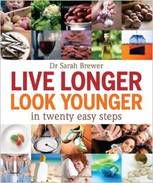
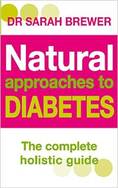
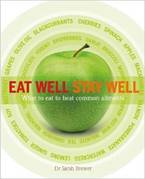
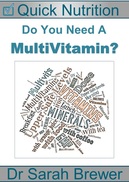
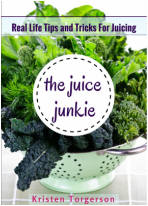

 RSS Feed
RSS Feed




